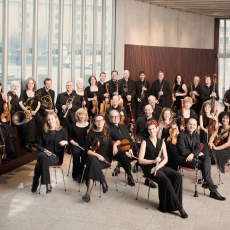Mozart Colloredo Serenade & Divertimento - SCO & Alexander Janiczek - International Record Review
Although most of Mozart's lighter orchestral pieces - serenades, divertimenti and cassations - were intended for summer occasions, usually out of doors, CDs like this new one from Alexander Janiczek and the Scottish Chamber Orchestra are welcome at any time of the year (this new one should attract uncommitted holders of a Christmas record token). Although both these works are in D major, there is plenty of variety of every kind - and anyway, it's better to listen separately to these two superficially similar yet in important respects quite different compositions.
The Serenade, K203/K189b, along with its spritely March, K237/K189c, was composed in Salzburg in August 1774. It is quite richly scored, with oboes periodically replaced by flutes, a bassoon, two horns and two clarini, as well as the usual complement of strings. It is a charming, occasionally boisterous work in seven movements, with its three menuets and trios in turn displaying more variety in colour and mood than is usual in serenades. It is unclear whether it was written for the ceremony ending the university year, or whether it was intended for Archbishop Colloredo's name day. The Andante, first Trio and fourth movement (Allegro) provide a built-in violin concerto, which is happily dispatched, and at times affectionately lingered over, by Janiczek. His direction of the programme cannot be faulted: there is firm control in the introductory March, brilliant playing in the opening Andante maestoso - Allegro assai, and plenty of ear-catching detail later, when the woodwinds have the chance to enjoy themselves.
The Divertimento, K251, dated almost two years later, and scored for oboe, two horns, two violins, viola and string bass, could be performed one to a part, but this would produce rather thin textures in the bigger movements. Commentators are not in agreement over the purpose of this piece. For what it's worth, it seems to me to lack the scale and impact of the big open-air serenades, etc., and I add my voice to those who favour the idea that it was Mozart's name-day present to Nannerl for July 26th (despite the fact that Leopold referred to it in 1778 as this ‘Finalmusik Synfonie'). There are signs of haste, and many felicitous touches - such as the growth of the second Menuet (which lacks a trio) into a Tempo con variazioni. There follow a rapid Rondeau and a concluding March in the French style.
The Divertimento is generously provided with recordings. For the grandeur of the Serenade and the lighter touches of K251 there is nothing to beat Willi Boskovky's glorious old discs with the Vienna Mozart Ensemble. Dieter Klöcker and Tom Koopman also deserve consideration. The SCO plays on its regular impressive form, with equal satisfaction coming from the strings and winds - the oboe in particular shines in the Rondeau of K251, but flutes, bassoon and the brass also make the most of their chances. Duncan Druce's note contains valuable material well presented, and the recording is of high standard, impressively balanced and attractively resonant. As usual with Linn, the product has been carefully planned, and looks as good as it sounds.

